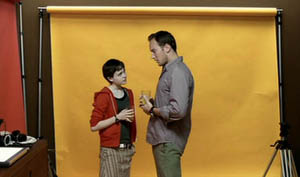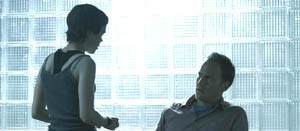|
Also known as "a collection of images designed to make people wince." The term "hard candy" is, I'm given to understand, a pedophile term for underage girls. I'll take that as true, seeing as I'm not going to go hang out in any of the places or with any of the people I'd need to in order to verify this. So yes, this film is about a guy who likes his girls young. Way young. If that bothers you, you may be either pleased or disturbed even further by what comes after. Not my fault if it's the latter. 
Human biology can be an annoying encumbrance at times. Societal mores are in their infancy compared to the millions of years worth of evolutionary programming screaming loudly that thirteen year-olds are indeed of breeding age and should get out there and look for a mate before they die at the ripe old age of twenty. Humankind had not established its total dominance of the Earth for nearly as long as would be needed for such impulses to weaken and relax. Teenaged girls are very pretty to teenaged boys, and the fact is that they do not stop being cute when one gets older. Their behavior can become considerably more off-putting, by contrast, but nature intended them to be supremely appealing physically, and as such they are. Most teens in movies and TV are played by non-teen actors, and knowing this, it's very easy, at least in terms of eye candy, to forget about age barriers. Hard Candy doesn't grant the viewer the comfort of any such ambiguous luxury. In this film, Ellen Page looks like a child. With her short haircut and nearly-nonexistent figure, she's barely even distinctively female, and from the moment that slick thirtyish photographer Jeff wanders into a coffee shop and begins wiping the icing from the lips of fourteen-year old Hayley, you want to hit him in the face with a shovel. There's a palpable turning in the brain, an unquestionable sense that wherever the line is drawn, it's somewhere very, very far away. We may want to give high-fives to the ghost of Bogart for scoring nineteen-year old Lauren Bacall, but this isn't even in the same time zone as cool or slick. The two have met on a chat board and arranged to meet in person, a meeting which rapidly turns more private as the pair head back to Jeff's house. It turns out, however, that this is a game of predator and other predator, and Jeff awakens after being unwittingly drugged to find himself securely tied up and at the mercy of tiny, frail-looking Hayley, who quickly reveals a deep hatred for Jeff and his kind. Beyond this first-act revelation, there's very little conventional plot. The remainder of the film is a series of conversations between the pair, emotionally fencing with one another as the situation steadily grows more fraught with consequence. Our inital reaction is one of smug pleasedness as the pervert is placed at the mercy of his would-be victim; this inital pleasure becomes less pleasurable as things go. Whatever we as a society feel about pedophiles and what they deserve, most of us don't necessarily want to see it happen right in front of us. As Hayley makes clear her intention to castrate her would-be assailant, he makes an impassioned plea that the commission of such a terrible act will damage her forever. He's clearly more worried about his own immediate danger, but he has a valid point. Shouldn't she just call the cops? It would be more comforting to us as viewers, but this isn't a film about comfort. Hayley believes Jeff is responsible for the murder of a local girl. If the film gave us a definitive "yes" answer to that, we could perhaps feel more at ease with what could be seen as a justified vendetta, but while she seems sure of the rightness of her actions, we never are. 
While effective, the film does make the error-not gratuitously, but it is made-of making Hayley almost hyper-competent, despite a few instances of attempting to show her losing her grip on the situation. At these points, the film begins to veer from character drama into pure gratification cinema, wherein we watch the guilty get repeatedly thwarted as we likely think they deserve. Without a prior visit, how would Hayley know to bring what is necessary in order for her to do what she does with Jeff's video setup, for example? How does a tiny fourteen-year old get a comatose grown man into a standing position on a chair? Through the miracle of cuts and fades, we don't have to really worry about it. We can almost begin to sympathize with Jeff's excuse that she seems older than she is; after all, when was the last time you met a young teen who spoke with the self-awareness and clear rationality of a college graduate? When she makes a strong argument about the mindset of an adult who allows a kid to mix her own screwdrivers, we can concede her rightness while still seriously doubting that any kid would actually lobby for the policing of her own behavior. Hayley is clearly a work of fiction, but she's excellently played, so much so that we almost buy it most of the time. Hard Candy is about emotional nuances and sympathies, but not about answering questions. If you're one of those odd sorts who seek out cinema to learn valuable life lessons, you may leave the film feeling frustrated or angry. You might leave it feeling that way, anyway. While thoroughly engrossing, it can scarcely be denied that the film is exploitation, pure and simple. How comfortable you are with that is your own issue. -review by Matt Murray
|
|
||||||||